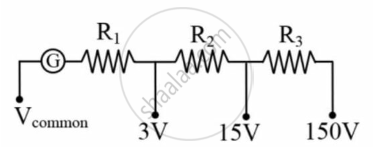Advertisements
Advertisements
Question
Draw a labelled diagram of a moving coil galvanometer and explain its working. What is the function of radial magnetic field inside the coil?
Solution
Moving coil Galvanometer:

Its working is based on the fact that when a current carrying coil is placed in a magnetic field, it experiences a torque.
Working:
Suppose the coil PQRS is suspended freely in the magnetic field.
Let, l = Length PQ or RS of the coil
b = Breadth QR or SP of the coil
n = Number of turns in the coil
Area of each turn of the coil, A = l × b
Let B = Strength of the magnetic field in which coil is suspended
I = Current passing through the coil in the direction PQRS
Let, at any instant, α be the angle which the normal drawn on the plane of the coil makes with the direction of magnetic field. The rectangular coil carrying current when placed in the magnetic field experiences a torque whose magnitude is given by,
τ = nIBA sinα
Due to deflecting torque, the coil rotates and suspension wire gets twisted. A restoring torque is set up in the suspension wire.
Let θ be the twist produced in the phosphor bronze strip due to rotation of the coil and K be the restoring torque per unit twist of the phosphor bronze strip. Then,
Total restoring torque produced = kθ
In equilibrium position of the coil,
Deflecting torque = Restoring torque
∴ NIBA = kθ
`or,I = k/(NBA) theta = Gtheta`
Where, `k/(NBA) = G=a` (Constant for a galvanometer)
It is known as galvanometer constant.
• Current sensitivity of the galvanometer is the deflection per unit current. `therefore phi/I = (NAB)/k`
• Voltage sensitivity is the deflection per unit voltage.
`therefore phi/V =(NAB)/k(1/V) = (NAB)/K 1/R (thereforeV= IR)`
The uniform radial magnetic field keeps the plane of the coil always parallel to the direction of the magnetic field. That is, the angle between the plane of the coil and the magnetic field is zero in all the orientations of the coil.
RELATED QUESTIONS
What are the advantages of using soft iron as a core, instead of steel, in the coils of galvanometers?
Why are the pole pieces of a horseshoe magnet in a moving coil galvanometer made cylinder in shape?
In a moving coil galvanometer the deflection (Φ) on the scale by a pointer attached to the spring is ______.
A moving coil galvanometer can be converted into an ammeter by ______.
The conversion of a moving coil galvanometer into a voltmeter is done by ______.
A voltmeter of variable ranges 3 V, 15 V, 150 V is to be designed by connecting resistances R1, R2, R3 in series with a galvanometer of resistance G = 20 Ω, as shown in Fig. The galvanometer gives full pass through its coil for 1 mA current i.e. "gives full pass through it's coil for 1 mA current". Then, the resistances R1, R2 and R3 (in kilo ohms) should be, respectively:

A moving coil galvanometer has 150 equal divisions. Its current sensitivity is 10-divisions per milliampere and voltage sensitivity is 2 divisions per millivolt. In order that each division reads 1 volt, the resistance in ohms needed to be connected in series with the coil will be ______.
Assertion: When an electric current is passed through a moving coil galvanometer, its coil gets deflected.
Reason: A circular coil produces a uniform magnetic field around itself when an electric current is passed through it.
A galvanometer of resistance 100 Ω gives a full-scale deflection for a potential difference of 200 mV.
- What must be the resistance connected to convert the galvanometer into an ammeter of the range 0-200 mA?
- Determine resistance of the ammeter.
